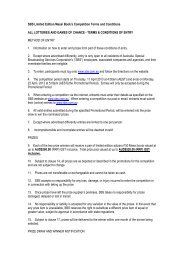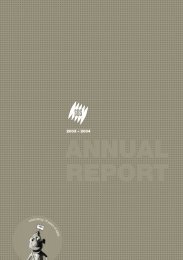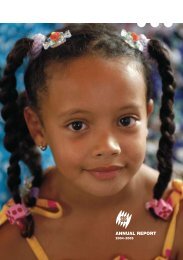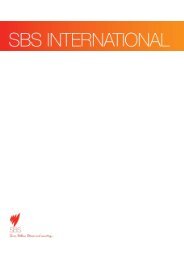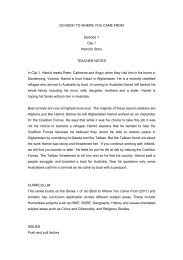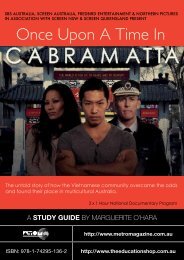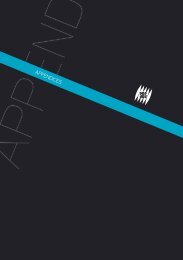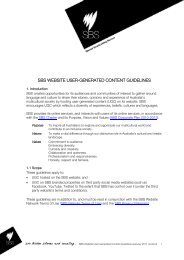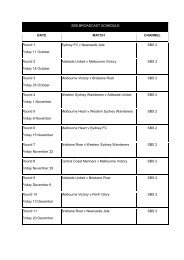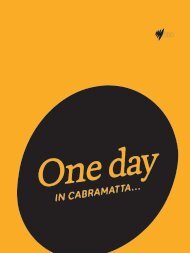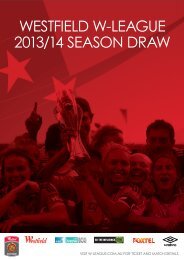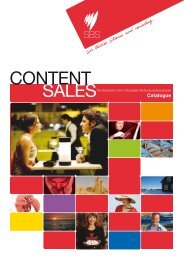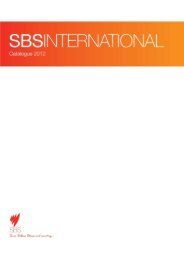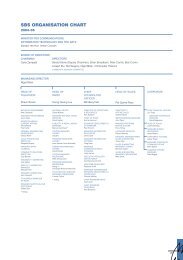AnnuAl REPORT 2011-2012 - Sbs
AnnuAl REPORT 2011-2012 - Sbs
AnnuAl REPORT 2011-2012 - Sbs
- TAGS
- annual
- media.sbs.com.au
Create successful ePaper yourself
Turn your PDF publications into a flip-book with our unique Google optimized e-Paper software.
The Family<br />
SbS Radio supported the Family with talkback<br />
programming and related segments to enhance audiences’<br />
interaction with the Family by driving dialogue around<br />
the big ideas in the series. talkback was conducted in<br />
14 languages.<br />
SBS Radio Schedule Review<br />
SbS broadcasts in more than 60 languages on its<br />
analogue radio schedule, more than any other network in<br />
the world.<br />
in <strong>2011</strong>–12, SbS began to undertake a review of the<br />
languages broadcast on its analogue radio schedule to<br />
ensure the languages broadcast reflect today’s Australia.<br />
the last major review of the SbS Radio Schedule<br />
was more than 18 years ago in 1994, and since then<br />
Australia’s demographics have changed significantly.<br />
the relative size of some languages spoken has changed<br />
and new languages are being spoken in Australia as a<br />
result of new migration patterns and refugee and asylum<br />
seeker intake. the use of in-language media and the mix<br />
of languages in Australia has also significantly changed<br />
since the last review.<br />
in April <strong>2012</strong>, SbS Radio released for public consultation<br />
the proposed Selection criteria which outlined how<br />
languages would be considered in a future review of the<br />
radio schedule.<br />
More than 1200 submissions were received and feedback<br />
taken into account before final selection criteria to be<br />
applied to a review released in june <strong>2012</strong>.<br />
SbS is using data from the <strong>2011</strong> census to help determine<br />
the shape of its revised Radio Schedule which will be<br />
released towards the end of <strong>2012</strong> and implemented on<br />
air in 2013.<br />
A revised schedule will enable SbS to better deliver on<br />
its charter obligations by better servicing the largest<br />
communities with culturally and linguistically diverse<br />
language (cALD) backgrounds, and offering more<br />
services to emerging high-needs communities.<br />
SbS expects to be able to produce more languages and<br />
distribute its in-language services over more platforms<br />
than ever before including analogue and digital radio,<br />
digital television, mobiles apps and online.<br />
Quarterly Commissioning<br />
Quarterly commissioning is an SbS Radio initiative to<br />
support new, original in-language multicultural content<br />
that shines a light on modern, multicultural Australia.<br />
in <strong>2011</strong>–12 SbS Quarterly commissioning was awarded<br />
to projects such as an exploration into growing up Asian<br />
and gay in Australia, an investigation into whether social<br />
media is bringing us together – or increasing our isolation,<br />
and a series of features looking into the new wave of<br />
italian immigration to Australia in lieu of the economic<br />
circumstances in italy.<br />
the italian project was broadcast in italian, on WNA Radio<br />
and in-language radio programs.<br />
Subtitling<br />
in order to provide multilingual and multicultural<br />
television services that inform, educate and entertain<br />
all Australians, SbS broadcasts english language<br />
programming as well as english-language subtitled<br />
non-english language programming.<br />
Programs in a language other than english (LOte) (other<br />
than SbS’s WorldWatch schedule) are made accessible<br />
to a wider audience through english language subtitles.<br />
Subtitling enables audiences, regardless of their cultural<br />
provenance to access programs in-language, SbS<br />
predominantly uses subtitles rather than voice-over as<br />
subtitling retains the linguistic and cultural integrity of the<br />
original programs and allows for effective cross-cultural<br />
communication.<br />
in <strong>2011</strong>–12 SbS broadcast:<br />
• 1541 hours of subtitled programs on SbS ONe;<br />
• 1768 hours of subtitled programs on SbS tWO<br />
in 117 languages and dialects across SbS ONe<br />
(Appendix 12) and SbS tWO (Appendix 13).<br />
SbS provides a re-narration service for some non-english<br />
programs where the program uses narration to convey<br />
the information. the original narration is re-narrated<br />
into english and other content, such as people being<br />
interviewed, is subtitled. A total of 209 hours was renarrated<br />
across SbS ONe and SbS tWO.<br />
<strong>AnnuAl</strong> RepoRt <strong>2011</strong> – <strong>2012</strong> 39



